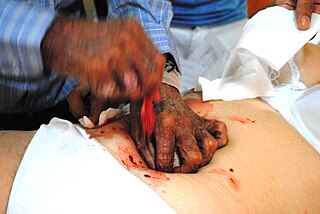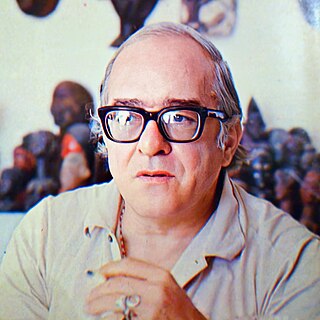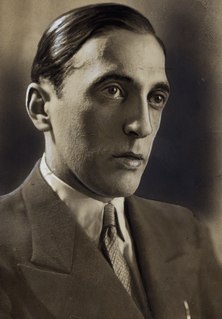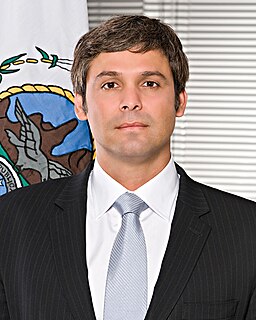Related Research Articles
Zé Arigó was a faith healer and proponent of psychic surgery. He claimed to have performed psychic surgery with his hands or with simple kitchen utensils while in a mediumistic trance, therefore he was also known as the Surgeon of the Rusty Knife. During his operations he supposedly embodied the spirit of Dr. Adolf Fritz.

Psychic surgery is a pseudoscientific medical fraud in which practitioners create the illusion of performing surgery with their bare hands and use sleight of hand, fake blood, and animal parts to convince the patient that diseased lesions have been removed and that the incision has spontaneously healed.

Marcus Vinícius da Cruz e Mello Moraes, better known as Vinícius de Moraes and nicknamed O Poetinha, was a Brazilian poet, diplomat, lyricist, essayist, musician, singer, and playwright. With his frequent and diverse musical partners, including Antônio Carlos Jobim, his lyrics and compositions were instrumental in the birth and introduction to the world of bossa nova music. He recorded numerous albums, many in collaboration with noted artists, and also served as a successful Brazilian career diplomat.

José Maria da Silva Paranhos Júnior, Baron of Rio Branco was a Brazilian noble, diplomat, geographer, historian, politician and professor, considered to be the "father of Brazilian diplomacy". He was the son of statesman José Paranhos, Viscount of Rio Branco. The Baron of Rio Branco was a member of the Brazilian Academy of Letters, occupying its 34th chair from 1898 until his death in 1912. As a representative of Brazil, he managed to peacefully resolve all Brazil's border disputes with its South American neighbours and incorporate 900 thousand kilometers through his diplomacy alone.

Manuel Dias de Abreu was a Brazilian physician and scientist, the inventor of abreugraphy, a rapid radiography of the lungs for screening tuberculosis. He is considered one of the most important Brazilian physicians, side by side with Carlos Chagas, Vital Brazil and Oswaldo Cruz.

Nise da Silveira was a Brazilian psychiatrist and a student of Carl Jung. She devoted her life to psychiatry and has never been in agreement with the aggressive forms of treatment of her time such as commitment to psychiatric hospitals, electroshock, insulin therapy and lobotomy.

João Teixeira de Faria, known also as João de Deus, is a Brazilian convicted sex offender who rose to fame as a self-proclaimed medium and psychic surgeon. He was based in Abadiânia, where he ran a "spiritual healing center" called the Casa de Dom Inácio de Loyola. He has received media coverage on CNN, ABC News, and The Oprah Winfrey Show, amongst others. James Randi and Joe Nickell exposed his healing procedures as nothing more than carnival tricks, and there is no evidence that the benefits that have been reported by patients are anything more than placebo effects.
Adolf Fritz, generally called Dr. Fritz, was a hypothetical German surgeon whose spirit has allegedly been channeled by several Brazilian psychic surgeons, starting with Zé Arigó in the 1950s and continuing up to the present. There is no evidence that he actually existed.
Rinaldo de Lamare was a Brazilian physician who specialized in pediatrics and a writer of books on child health and care for the general public. His family was of Danish and Norman origins. His father, Victor de Lamare, was an engineer. Aged 16 he moved to Rio de Janeiro, to prepare himself to study medicine at the medical school of the Federal University of Rio de Janeiro.

Paulinho da Viola is a Brazilian sambista, singer-songwriter, guitar, cavaquinho and mandolin player, known for his sophisticated harmonies and soft, gentle singing voice.

The Bi-Digital O-Ring Test (BDORT), characterized as a form of applied kinesiology, is a patented alternative medicine diagnostic procedure in which a patient forms an 'O' with his or her fingers, and the diagnostician subjectively evaluates the patient's health according to the patient's finger strength as the diagnostician tries to pry them apart.
Joaquim Lúcio Cardoso Filho, known as Lúcio Cardoso, was a Brazilian novelist, playwright, and poet.
Dr. Júlio Afrânio Peixoto was a Brazilian physician, writer, politician, historian, university president, and pioneering eugenicist. He held many public offices, including Brazilian congressional representative from Bahia in the federal Câmara de Deputados (1924–1930), first the president of the Universidade Federal do Rio de Janeiro, member of the Brazilian Cultural Center in the United States, president of the Academia Brasileira de Letras, and honorary doctorates from Coimbra University and the University of Lisbon, Portugal.

Roberto Farias was a Brazilian film director, producer and screenwriter. He directed 15 films during his career. His 1982 film Pra Frente, Brasil was entered into the 33rd Berlin International Film Festival. Farias' brother Reginaldo Faria is also a film director and actor.

Rubens Paiva was a Brazilian civil engineer and politician who, as a Congressman at the Brazilian Chamber of Deputies, opposed the implementation of a military dictatorship in Brazil in 1968, for which he was tortured and murdered.

Otávio de Faria was a Brazilian journalist and writer. He was elected a member of the Brazilian Academy of Letters on January 13, 1972. He was most noted as author of the monumental testimonial A Tragédia burguesa.
The Copa dos Campeões Estaduais, the "Cup of State Champions," was a competition for Brazilian association football clubs held in the years 1920 and 1936. In the absence of other notable national competitions, the winners considered themselves champions of Brazil. Participants were the champions of the states considered the then leading forces in Brazilian football.

Luiz Lindbergh Farias Filho, commonly known only as Lindbergh Farias, is a Brazilian former student union leader and politician.

Caminho das Índias is a Brazilian telenovela produced by TV Globo. It ran from 19 January to 11 September 2009. Caminho das Índias is a story of contrasts which examines the differences in beliefs and values of the Eastern and Western world.

CNN Brazil is a Brazilian news-based pay television channel. Launched on 15 March 2020, CNN Brazil is owned by Novus Media, a joint-venture between Douglas Tavolaro, former header of RecordTV's news division, and Rubens Menin, owner of MRV Engenharia. Novus Media has a licensing agreement with original CNN channel owned by Warner Bros. Discovery.